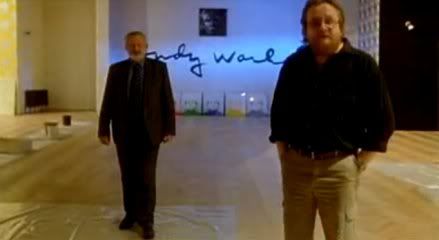Warholas are everywhere.

Ventured back to IU Cinema for the first time in a month to see 2001's Absolut Warhola, which is unique among Andy Warhol documentaries since none of its interview subjects ever met the man, nor did he ever set foot in the rural Slovakian town where it was shot. Or, rather, I should say the two towns since one of them, Miková, is where his extended family lives and the other, Medzilaborce, is where the Andy Warhol Museum of Modern Art is located. Finding either town is easier said than done, though, as the film crew discovers.
Headed up by Polish filmmaker Stanislaw Mucha (whose most recent documentary is entitled The Truth About Dracula), the crew tracks down a number of Warhol's aunts, uncles and cousins, all of whom are eager to talk about life in Slovakia and their tangential relationship with one of the most iconic artists of the 20th century. Accurate biographical details are hard to come by, though, and to a man they vehemently deny his homosexuality. ("There's never been a homosexual from Miková," one of his cousins insists.) As for the museum, it has some obvious funding issues (the roof leaks whenever it rains) and the local gypsy population complains about not being let inside, but it's still around today so I guess they're doing something right. (Being featured in this film probably did a great deal to raise its profile.)
Probably the most enigmatic figure in the whole film is Warhol's "Ruthenian Doppelgänger," who goes around distributing cans of Campbell's soup to people. He's not even a relative; he's just some guy who looks like Warhol and pretends to be him from time to time. That can't be his full-time job, though. I doubt that sort of thing pays too well -- at least, not in Slovakia.